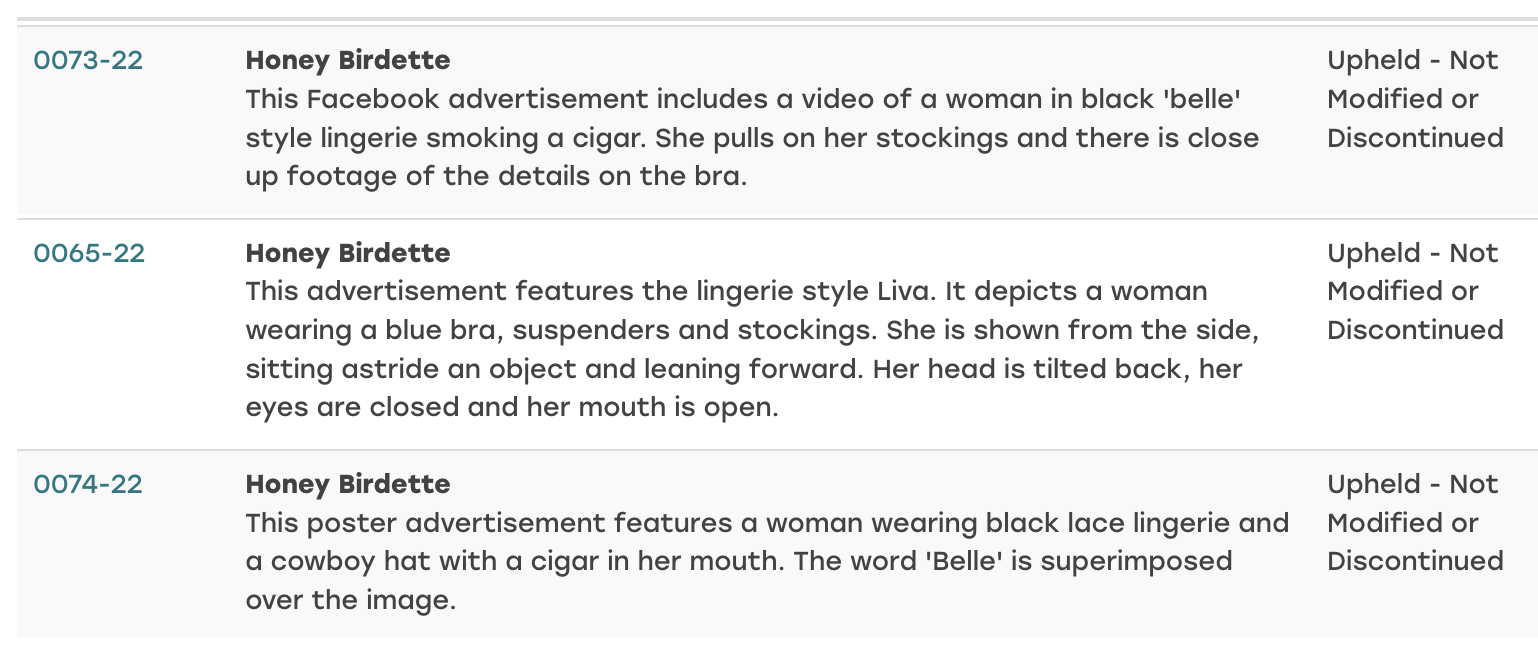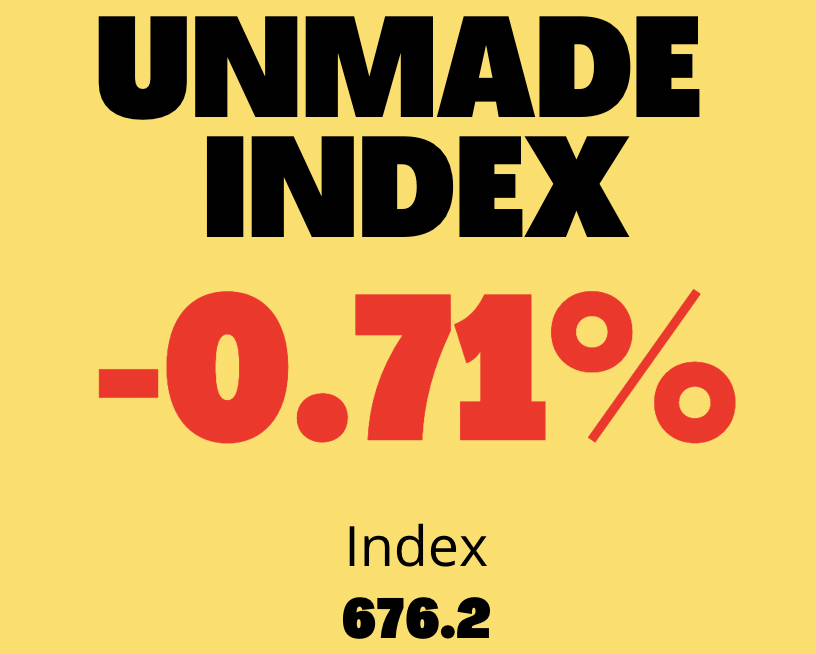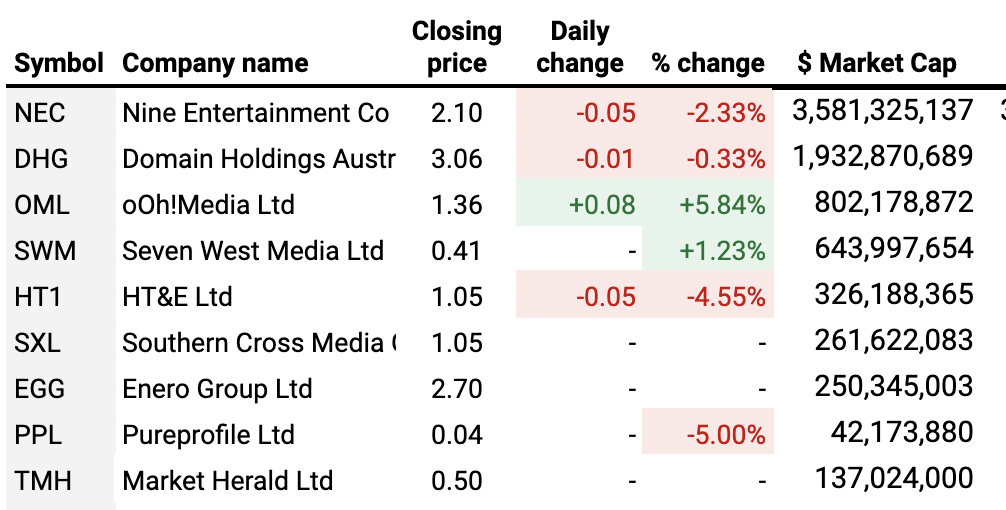Tuesdata: Three trends among the advertisers who broke the rules in 2022
Welcome to the first December edition of Unmade, with a deep dive into the advertisers who fell foul of Ad Standards in 2022.
We’ll be examining the advertisers who had rulings made against them – including United Petroleum, Honey Birdette, Coles, Unibet, Cancer Council, Uber and a whole slew of Instagram influencers.
Further down, we’ll also be looking at yesterday’s moves on the Unmade Index.
One way of supporting Unmade’s independent analysis is by using your company credit card to become a paying member.

The naughty list
Now we’ve hit December, it’s a timely moment to look back on a year’s worth of Ad Standards rulings.
Ad Standards – the rebranding of what used to be the Ad Standards Bureau – is the industry-funded body charged with setting standards within the advertising industry via self regulation.
The rulings carry no legal force, but the major stakeholders in the sector, including members of the Australian Association of National Advertisers and the major media owners, agree to be bound by them. Smaller advertisers and media outlets usually engage with Ad Standards rulings, perhaps not realising that they aren’t compelled to do so.
All valid complaints to Ad Standards – ie those which are actually about the codes of practice created by the AANA – are investigated and discussed by the body’s community panel, before the findings are later published on the website.
By the end of November, Ad Standards published its findings of case number 254 for 2022. Chances are there will be some more published in the coming days so this analysis is not comprehensive for the full year.
Of those investigations, it upheld 35 complaints which saw marketing campaigns being discontinued or amended, and upheld a further 13 cases where despite the finding going against the advertiser, the brand did not act on the finding.
That suggests that overall, about 20% of Ad Standards investigations lead to the complaint against the advertiser being upheld.
At the same point last year, there had been 336 investigations up to the end of November. Of those, 49 were upheld leading to campaigns being discontinued or abandoned, and a further 32 had findings made against them but the advertiser did not act upon it.
That suggests that in 2019, the level of findings against advertisers complained about was about 24%.
Trend 1: Mainstream brands are playing within the rules more then ever
A noticeable trend in 2022 is that hardly any household name brands were caught breaking the rules. depending how you define them, here were just seven large brands caught out across the year. They were:
Coles had a complain upheld after Instagram influencer The Stingy Mama promoted its Harry Potter products without labelling it as an advertising promotion. Although the supermarket had not authorised the content, it did have a commercial relationship with the influencer
Treasury Wine Estates – owner of Penfolds – was found against because influencer Aisha Jade, who it invited to a tasting, tagged the brand in her posts. Although the company argued she’d chosen to do the post without being contractually obliged to do so, it knew that by inviting her to the event she might make such a post, which made it marketing material.
Mitsubishi Motors was ruled against for its portrayal of a Pajero four wheel drive using an unsafe technique to tow a bogged down vehicle.
Unibet published an online promotion with the slogan “Cashing Out is for Pussies”, which the jury ruled was a failure to promote gambling responsibly and also breached rules on language around gender.
Fuel retailer United Petroleum was pinged for a misleading promotion selling “any two Coca Cola cans for $4” as if it was a saving on the usual $2 single can price. It was a technicality. The individual price should have been $2.20.
A Cancer Council of Victoria ad which used the visual metaphor of a girl being bombarded with junk food to represent the effect of multiple fast food advertising messages was ruled against as encouraging bullying.
Uber Eats was ruled against for failing to treat domestic violence appropriately in an ad featuring a man standing below an apartment while his former partner threw his possessions out of the window.
Trend 2: Brands are being tripped up with influencer engagement
There were several cases – far more than in previous years – in which brands of all sizes found themselves the subject of complaints where influencers had tagged them, but failed to disclose they were being paid, or receiving free gifts.
Ad Standards has this year evolved its rulings around influencers that effectively if a brand has struck up a relationship with them, and as a result they give exposure to the product, it will likely be defined as an advertising promotion, even if money has not changed hands directly, or the brand did not know the post was coming.
Trend 3: Some of the biggest offenders are untouchable
Lingerie retailer Honey Birdette was once again one of the most complained about brands of the year, with most complaints focused on the window displays in its shopping centre stores, as being too exploitative of women. While many, although not all, of the complaints were upheld, Ad Standards was powerless to oblige the company to remove the posters.

Sadly Wicked Campers, which regularly draws complaints about the slogans on its vehicles, survived the pandemic. In 2022, it had just one complain upheld, for a transphobic joke painted on one of its vehicles. As usual, it ignored the ruling.
There is also a wider point to consider about the industry’s self regulation. For the marketing industry, Ad Standards has been a big success. By setting and enforcing codes for the industry to follow, it has – up to now – fended off more aggressive legislation.
This relies on staying on the right side of community expectations and politicians’ appetite to regulate further.
Where the industry is dancing with the devil is around the promotion of gambling. The tighter – but still non-draconian – rules around gambling ads announced by Anthony Albanese last month suggested that politicians are responding to public concerns. It’s likely to be a first step.
The major public concern for the public though is not so much individual betting ads, as the sheer volume of gambling messages associated with nearly every form of sport. In large part, this advertising revenue is what underpins the ability of the TV networks to pay such huge amounts for the TV rights deals. The networks are among the gambling addicts.
At present, other then lightly restricting time slots, the industry is doing nothing to tackle the volume issue.
Overall volume is not within Ad Standards’ remit, but if the industry does not tackle it, politicians eventually will.

Unmade Index: SCA
Like the wider All Ords, there was no discernible direction for the Unmade Index of ASX listed media and marketing companies yesterday. Eventually the index dropped slightly, by 0.71% to 676 points.

Out of home company Ooh Media saw the biggest rise, with a growth of 5.84% taking it back above an $800m market capitalisation.
HT&E, parent company of ARN radio, fell by 4.55%.

Time to let you go about a day in which colleagues will be divided into two camps – those who were up at 2am to watch the Socceroos make a little slice of history for themselves in the World Cup, and those who wish they had been.
Have a great day.
Toodlepip…
Tim Burrowes
tim@unmade.media


